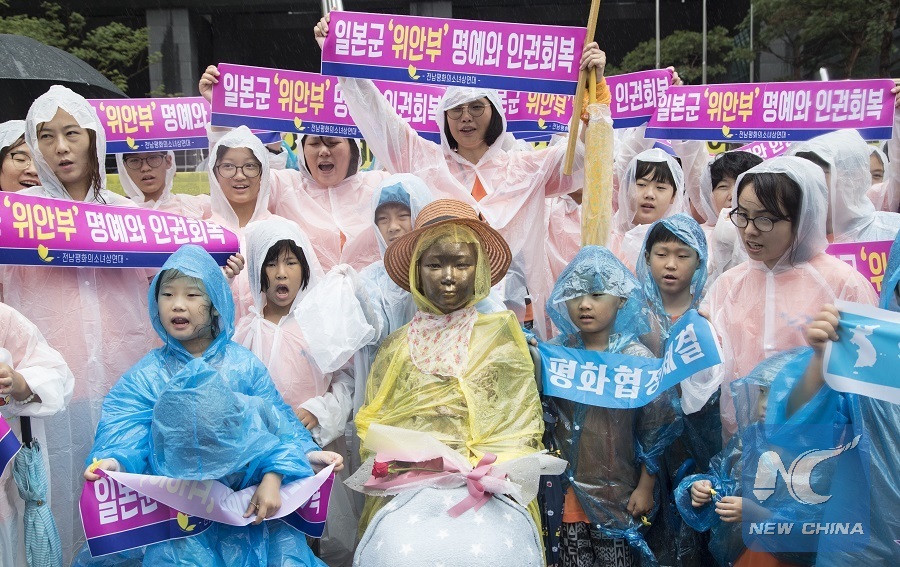
People attend an anti-Japan protest with a statue of "comfort women" in Seoul, South Korea, Aug. 15, 2017. (Xinhua/Lee Sang-ho)
SEOUL, Dec. 28 (Xinhua) -- South Korean President Moon Jae-in said Thursday that the wartime sexual slavery issue cannot be resolved by the 2015 deal with Japan as a secret agreement was found between the two countries after reviewing the procedure of the deal.
Moon said that though the deal was an official promise approved by the leaders of both countries, he as a president of South Korea should make it clear again that the comfort women issue cannot be resolved by the 2015 deal.
The South Korean leader said he felt a heavy heart when he was reported on the review result over the 2015 deal, presidential spokesman Park Soo-hyun told a press briefing.
Moon's comments came a day after Seoul's foreign ministry confirmed a secret deal in the 2015 agreement between the previous South Korean government under ousted President Park Geun-hye and the Japanese government led by Prime Minister Shinzo Abe.
The Park government reached a "final and irreversible" agreement with Japan over South Korean victims who were forced into sexual servitude for Japanese military brothels during World War II.
Under the deal reached on Dec. 28, 2015, Japan agreed to offer 1 billion yen (9 million U.S. dollars) to a foundation dedicated to supporting the South Korean sex slavery victims in return for the final and irreversible agreement.
Moon said a grave fault was found in procedures and contents of the 2015 negotiations between the governments of the two countries, noting that it cannot be escaped unfortunately.
It was a costly blunder, Moon said, as it was a political agreement excluding the victims and ordinary South Koreans.
Moon noted that the 2015 deal was against the international community's universal principle of resolving historical issues, saying people were deeply disappointed at the existence of undisclosed agreements.
He expressed his deep consolation for the victims who were scarred once again by the existence of the undisclosed agreements, saying truth is the most important thing in facing history.
Moon stressed that courage will be needed to squarely face up to history when history was painful enough to shun, saying cure, reconciliation and future can begin when facing up to the painful history.
He vowed not to damage truth and principle in dealing with history, but he noted that he will try to restore normal diplomatic relations with Japan for future-oriented cooperation separately from the historical issues.
President Moon, who took office in May, ordered a review over how the 2015 deal was reached and whether there was any procedural fault, saying the 2015 deal was not "emotionally" acceptable to ordinary South Koreans.
The task force team under Foreign Minister Kang Kyung-wha announced the review result Wednesday, saying secret agreements were found in the 2015 deal.
According to the 31-page review report, Japan demanded South Korea persuade advocacy groups supporting the sex slavery victims to accept the 2015 deal. Then South Korean government vowed to make efforts to persuade the groups, actually accepting Japan's demand.
Behind the scenes, Japan demanded South Korea not use the word "sex slave," and the South Korean side replied that it only used the word "comfort women" in the past, actually accepting Japan's demand, according to the report.
The Japanese side asked South Korea about how to move the girl statue erected outside the Japanese embassy in Seoul. Then South Korean government replied that it will make efforts to appropriately resolve that issue.
The girl statue, which symbolizes young girls forced into sexual slavery, was placed in front of the Japanese embassy in Seoul in December 2011 to mark the 1,000th rally demanding Japan's sincere apology and legal responsibility for the wartime atrocity.
Surviving South Korean victims and peace activists have held rally outside the Japanese embassy for more than two decades.
South Korea's governments had maintained a position that it has no right to move the girl statue as it was funded and placed by private citizens voluntarily, but the Park Geun-hye administration agreed on efforts to move the girl statue, the task force team said.
The Park government also lacked communications with the victims and failed to get understanding and agreement from the victims, the review report said, noting that the 2015 deal was reached from the government perspective.

